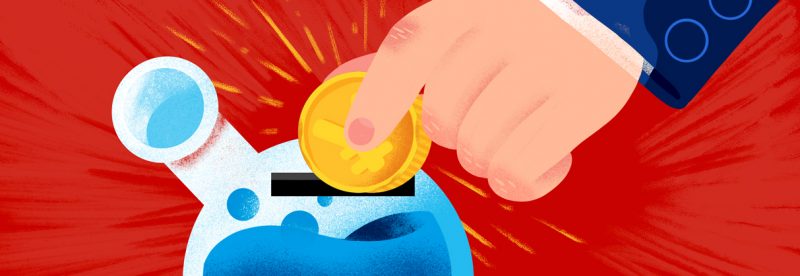BioNTech is on a mission to individualize cancer therapy by developing a range of different innovative therapies, a task that can be a rollercoaster ride, according to its Chief Business and Commercial Officer Sean Marett.
It’s been an interesting year for the German biotech. In July the company raised one of the biggest ever European biotech fundraising rounds with its €290M Series B. However, poor market conditions in the US led to its Nasdaq IPO, which was initially predicted to raise up to €725M, pricing at only €141M in October.
“A few days before we started trading, the biotech Nasdaq index hit its lowest point of the year in a market which was talking about WeWork,” Marett told me.
“I think these things do influence investors, but we were very, very determined to get it done… It wasn’t about maximizing valuation or fundraising; it was more about optimizing and allowing public investors to effectively invest in what was an extension of the Series B financing.”

Despite what might be seen by some as a setback, Marett is confident that the company’s multi-therapy approach will soon reap benefits for cancer patients.
“Our vision is to address cancer and in order to address cancer, you have to recognize that each patient is unique. This means that some approaches will be good for one patient, but there may be other approaches more appropriate to use for another.”
As well as developing several messenger RNA therapeutics, BioNTech has a CAR T-cell therapy in development that will target solid tumors, and a number of antibody and small molecule drugs.
“If you look at us, I would not class us as a technology platform company looking to use the technology for diseases. What we are is an oncology-focused company using platforms as a means to an end,” explained Marett.
Although BioNTech has already succeeded in becoming one of the biggest and best funded German biotechs, it has ambitions to become a truly global company. For this to be successful, it is important to attract investment from powerhouses such as the US and Asia.

Founded in 2008, it was not until early 2018, when the company raised its €225M Series A round, that it sought investment outside of Europe.
“With the first Series A, we were focused on European family offices and US investors. In Series B, it was Europe, the US and Asia. The reason for Asia is because we have a real interest, as part of building the company, in having a presence in China. It’s the second largest pharmaceutical market in the world. You can’t ignore it if you want to be a global business.”
Now the company is listed on the Nasdaq, it is in a good position to further develop itself in the US. But Marett cautions that it can be tricky to be based so far away from where you are listed as a company.
“When you list in the US, you do have to work harder as a foreign issuer, compared to if you were in your local market… I think you need to weigh these pros and cons very carefully… We’re 3,000 miles away from the Nasdaq and we have to work harder for investors to continue to take an interest in us because of the location,” he explained.
“Before we decided to list on the Nasdaq, we did evaluate other exchanges. I think for what we want to do, the Nasdaq is the right exchange for us. We plan to build infrastructure in the US and in Europe, and there’s no doubt that there are significant pools of dedicated pharma and biotech investment capital available in the US, which may not be accessible if you are here in Europe.”

Over the last decade, BioNTech has succeeded in recruiting some well known partners to help it get to where it is today, including Genentech, Genmab and Sanofi, among others. Another way to make expanding into a foreign market easier is to partner with companies based in that part of the world.
“Genentech is a good example for us because when we decided to partner, one of the attractions of Genentech… was that it has the most amazing network of clinicians in the US. We’re a German company with a good network in Germany, but at that time, we had very little network in the US.”
Marett, who is originally from the UK, believes that European biotech investors can learn a lot from American models of business growth. He advocates putting larger amounts of money into companies at an earlier stage.
“It’s small amounts of drip-feed, and that is because all of us, as Europeans, are actually quite risk averse. I think that’s where we need to change our views. I really do. When we set up BioNTech and started to build it, we really took a US model of growth. If you think big, there is no reason at all, provided you can substantiate it with your science, why you can’t do what the Americans do.”
While he is keen on the US approach to business, Marett does admit, however, that public markets in the US have been somewhat unstable in recent months.

“I think there’s an election that’s steering the US where people are very sensitive to the rhetoric around healthcare prices… Although you can’t definitely put your finger on it, there was a feeling that people were just mentioning Uber, Lift and WeWork’s IPOs, and I believe that does have a read through,” he explained.
“As with all of these things, it demonstrated it’s a cyclical effect and we will see the other end of the cycle.”
On the research side of things, 2020 is set to be a busy year for BioNTech. It is expecting readouts from several phase I and II trials, including an mRNA therapy for advanced melanoma and triple negative breast cancer, and it is hoping to start at least one phase III trial by the end of the year. It also has a small molecule and a solid tumor-targeting CAR-T cell therapy going into human trials for the first time.
In addition to his experience at BioNTech over the last decade, Marett has worked at a number of illustrious companies both in big pharma, at GSK and Pfizer, and also at Evotec, another German biotech success story. He believes that being passionate about the science can really help drive you through the ups and downs that are inevitable in a biotech company.
“When we started to look for a partner for our neoepitope vaccine programme [at BioNTech], no one was interested. Twenty-four months later, we had three companies in negotiations in parallel, with two additional pharma companies asking us whether they could join the queue.
“I think it would’ve been easy to give up a few years earlier, but if you believe that that’s the way the medicine is going, it really showed me that you have to stick to your beliefs.”
Images via E. Resko





